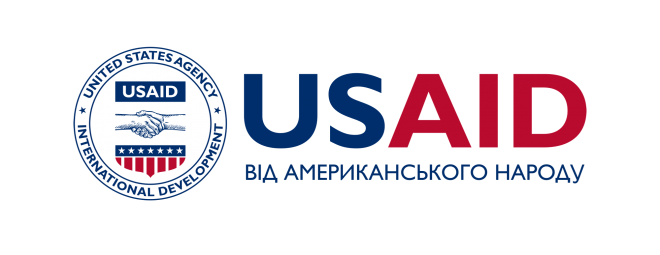When was it that you first asked yourselves: Who am I? What blood runs in my veins? Who were my ancestors? Where were they born and what did they do?
How many of you, at least for fun, tried to draw your genealogical tree? If so, did you ever reach the roots of this tree?
Some know about their ancestors from the very childhood and for some all of this information becomes a discovery being an adult.
Old photos, as Kuzima Skriabin used to sing. Documents from an archive. Unbelievable life dramas and storylines in narrations by parents, grandmas and grandpas. Family traditions, legends and superstitions. All of these are much more interesting than watching serials by NBO, Showtime or BBC.
This is especially true when there are 7 nationalities mingled in a person, and the relatives used to live almost in the whole of Europe. That’s how it is with the characters from our special project “The Origins”.
We created it not just to remind of the multinational features of Transcarpathia and its inhabitants but also to appeal to everybody to do a research of their roots, never to forget who we are and respect others’ roots.
Share your stories about your relatives with the hashtag #моє_коріння (my roots) and forward them to us.
And now let’s go, read and see what we have prepared for you.
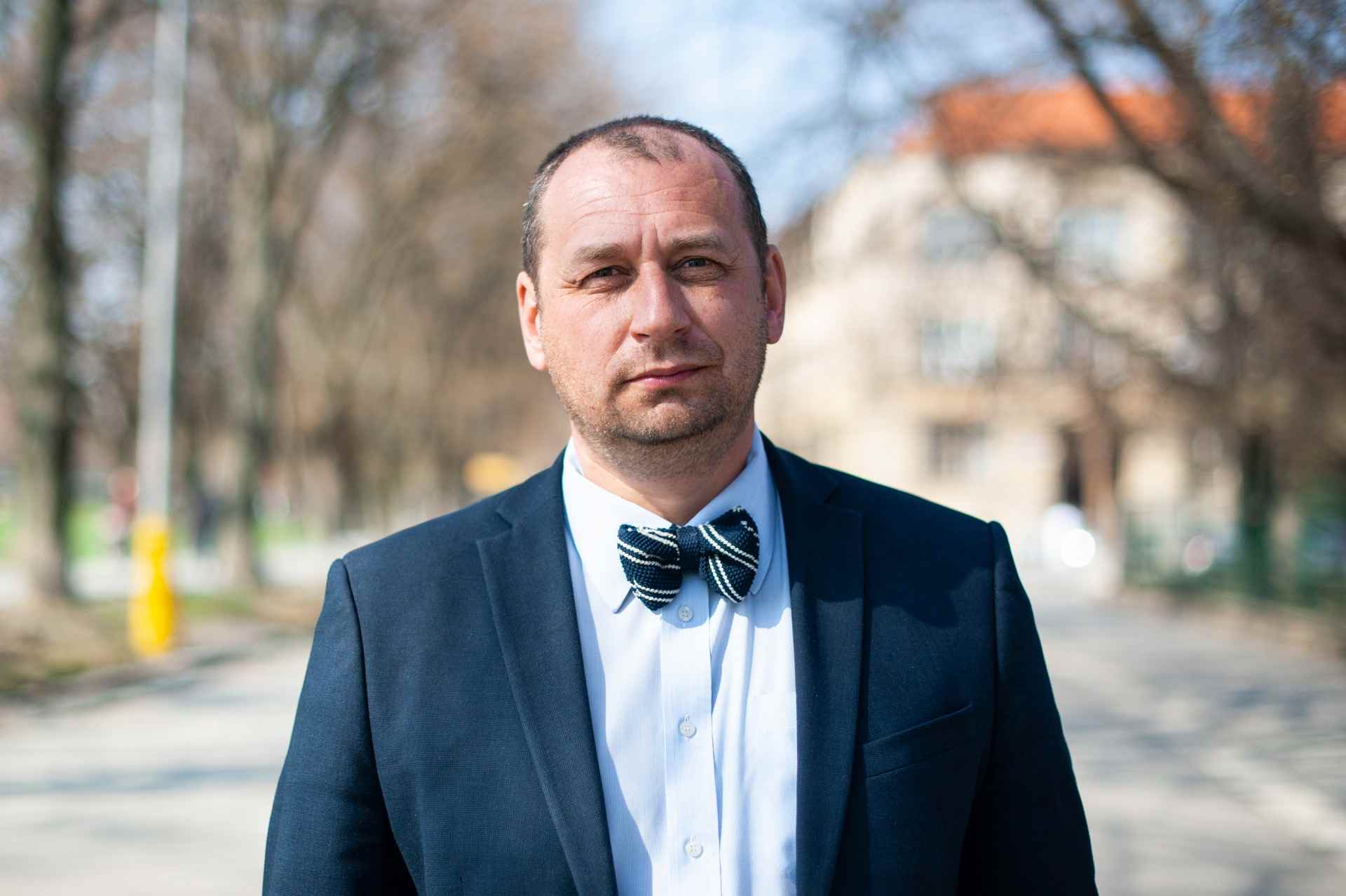
Fedir Shandor
expert on tourism
I am a Transcarpathian Ukrainian. I got interested in my family studies being a student of the Historical faculty at Uzhhorod National University. I was surprised to know that, for all these years, my family never got interested in their roots and origins. I guess it’s the same for most of Transcarpathians nowadays.
By my mother’s line: grandfather was a Ukrainian, grandma and great-grandma were Italians from Trentino, while great-grandpa was a Horvath from Slavonia. By my father’s line: grandpa was half-Slovak and half-Hungarian and grandma was half-Ukrainian and half-Hungarian.
These features of polyethnicity are possessed by everyone so it would be inappropriate and spurious to talk about purity of likings.
What I remembered most from my childhood was my grandma’s carol songs and especially gastronomy: when I became a food blogger I realized the irregularity and variety of dishes in the family, when some gastronomical masterpieces were cooked with such casualty that gives grounds to confirm the national origins for some relatives in the family or other ones.
My wife Tetiana is half-Slovak and half-Ukrainian. So our kids have picked up the DNA from all the peoples that once inhabited the Carpathians.
It is due to the multinationality that I boost up the scale of my interests. I am interested in the history of those regions where my roots are from, and this way it’s easier for me to perceive in my own actions the specific features of the Carpathian region.
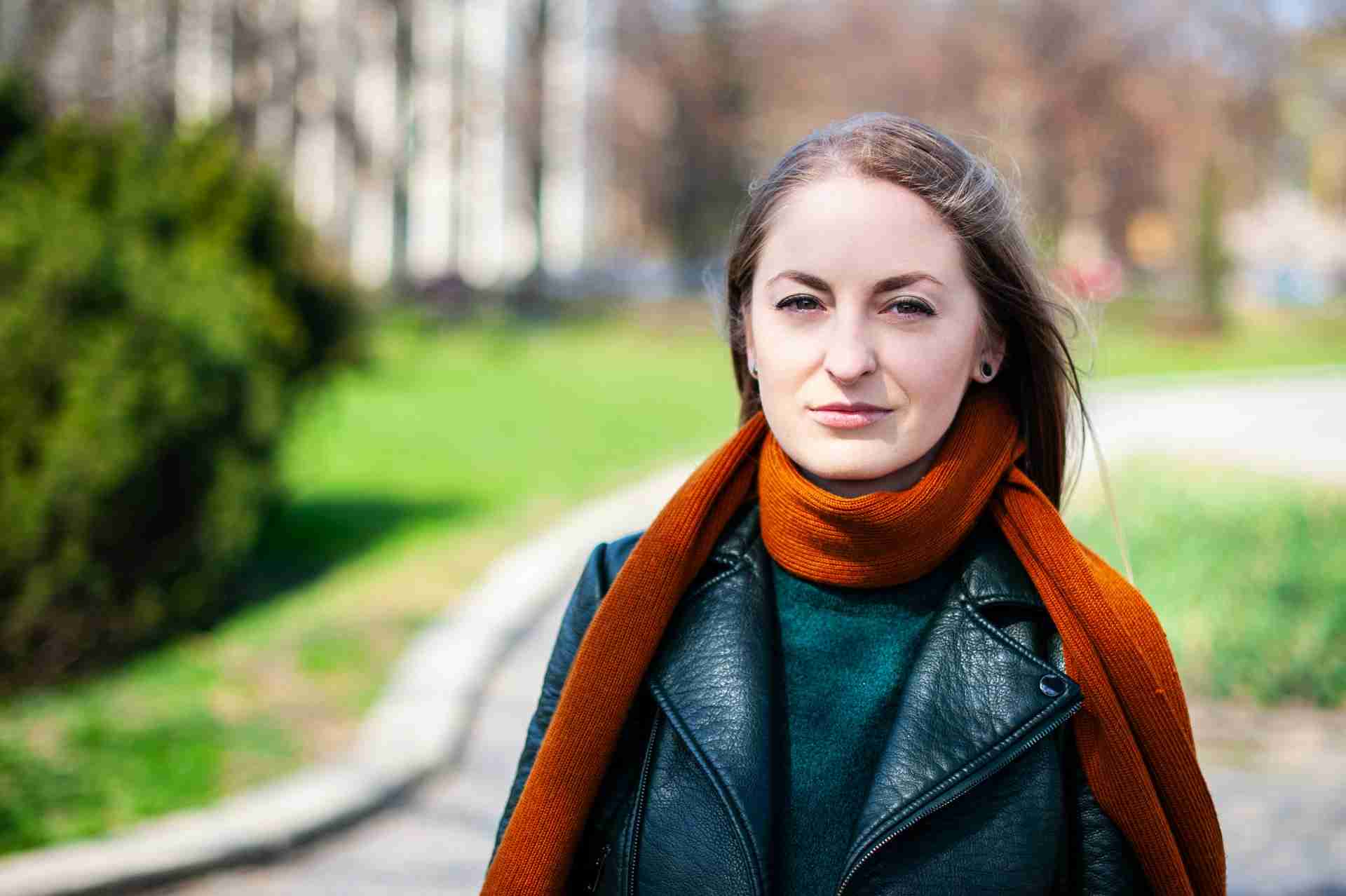
Katia Morgental
designer
I am a Ukrainian but there is yet Italian, Hungarian, German – or rather to say Swabian – blood running in my veins.
By y mother’s branch of the family tree I have everybody Ukrainian, though there is some info on the Polish branch of my great-grandma. But so far I have no immediate evidence to it, so it is only a nice family legend yet. The rest of my mom’s relatives are Ukrainians that have always lived in the territory of Transcarpathia.
By my father’s branch I have a totally international mix-up: Italians, Germans, Hungarians, Swabians. My great-grandma was an Italian, Maria Schiratti by name; she married a German Antal Morgenthal who sewed elegant men’s clothes. So their son Emil Morgental was already half-German and half-Italian, though by his charisma, appearance and temper he was truly a 100% Italian, loved dancing and fencing, drew fantastic cartoons and worked as a professional shoe-maker.
We accidentally learnt that grandpa, in his youth, did some drawing of landscapes in oil but nobody saw them but for the neighbors whom he presented the pictures. So I owe my gene of creativity, Italian expressiveness and love to cheese and wine, cooking and design to my Italian and German roots.
My great-grandpa Antal Morgental manufactured men’s clothes and even had his own label «Morgenthal». Grandpa, Emil Morgental produced shoes and was a fantastic cartoonist. And my Dad, Victor Morgental was engaged into technology and experimental stage of production of pottery and ceramics.
So what I do now in designing and art is just the result of the input from the three men, so important in my life. It’s their jobs that I continue.
I always loved to inquire my great-grandma about the story of her parents coming from northern Italy, to develop the town of Khust. They founded brickworks there and were involved into the town’s development. She often told me very interesting stories about parents, her childhood and life. It is very important and valuable, to know your own history. That’s how we get to know ourselves better, our life goals and missions.
I love my Italian part of the family’s history. There was a time that I dreamed of visiting the country, learn the language or even move there. At that time I had some ties to Italy, it even seemed to me that the air is sweeter there. I have friends and dearest living there so there is an opportunity to travel there. But I feel very well in Ukraine now.
As I grew up and had chances to see the world, I understood that I was not accidentally born here, and that made me love things around me all the more. Even as I am in some fantastic nooks of the Earth that I dreamt to visit and maybe even to stay and live, each time I remember our Carpathians. Then I turn on my Ukrainian playlist on my player and in my mind I am “homeward bound”. I can take a special breath here in the mountains as I take steps on my own land.
I guess I am mentally closer to Ukrainian authenticity but when it comes to cooking, fits of emotional expressiveness and gastronomical delight, I am 100% Italian. I like being such embodiment of various cultures, in this way I feel somewhat richer inside, because every nationality makes a significant impact on me.
I am quite often asked regarding my surname – it does sound uncommon. It Kyiv they suggest it is a kind of a nickname or a pseudonym that I invented for myself. In reality, I got it all from my great-grandpa, and our surname has quite a picturesque translation. In German “morgentahl” means as “a morning valley”. There is even a whole area with such name in Switzerland, and a subway station in Zurich. So I would like to travel to those parts someday.
As for some Italian things, I can remember the dinners in great-grandma’s garden, with all those roses always blooming and the smells of delicious food. And of course, the times when our Italian relatives used to come. Those family gatherings were always fine and noisy, with lots of wine, delicious food, usic and dancing. I have imprints of it in my child’s memory – the picking of vine harvest with the whole family, when everything was done together – finishing last year’s wine, picking the new year’s harvest, women cooking at the same time, children running about the yard. That was real life, like fine wine from Sorrento.
As for Ukrainian, I like it all, and in this case it’s also Transcarpathian, and that means such a colorful variety of customs and folk art. I feel like keeping and embrace more festive traditions, creating and collecting ethnical treasures – bedcovers, carpets, towels, textile things, pottery, clay earthenware. All such precious things I will take home.
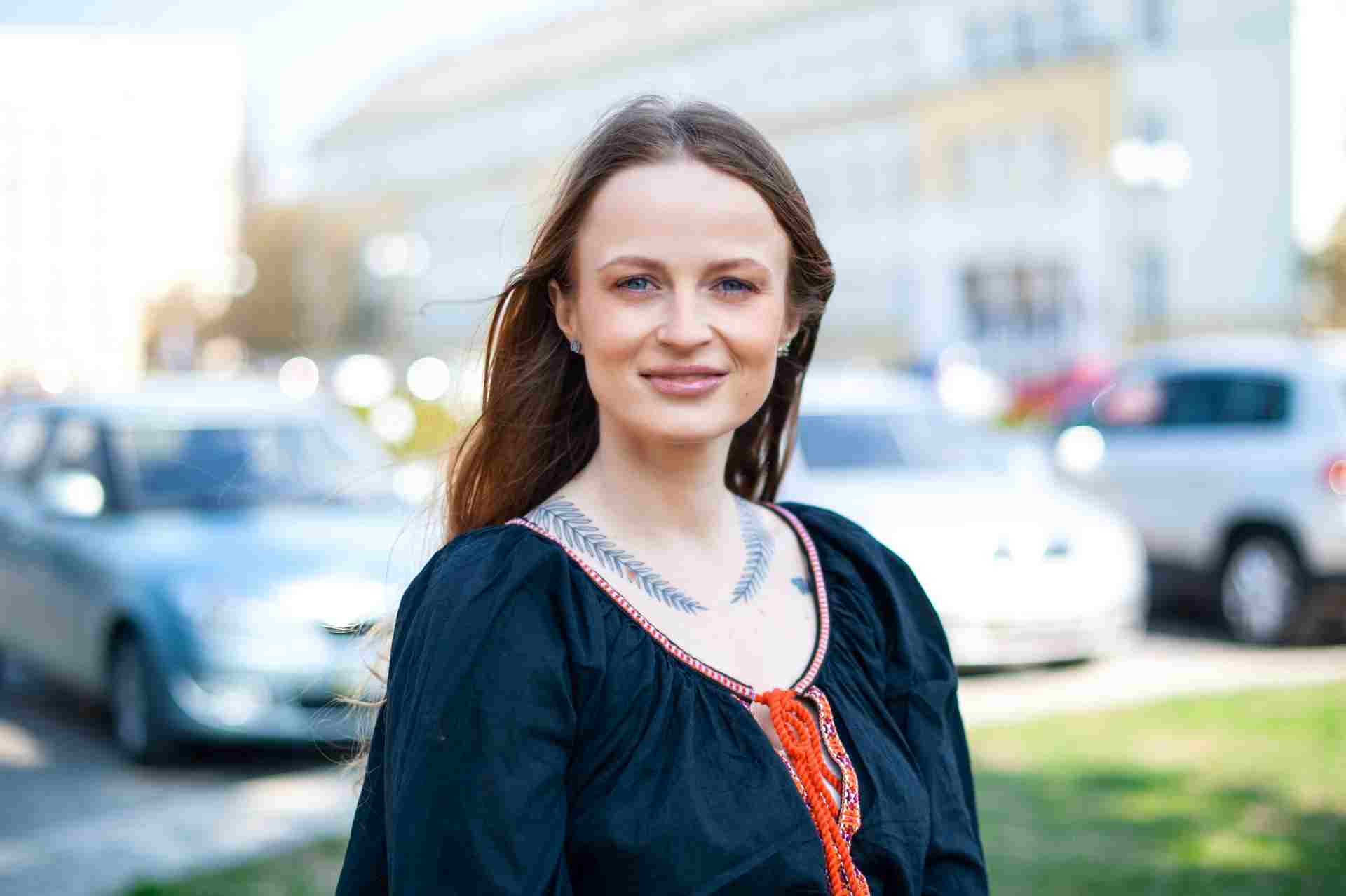
Olesia Smirnova
a journalist
I am Ukrainian by nationality. My mom’s from Ukraine, and Dad was born and spent his childhood in Kazakhstan. For all I know, in my family there are only two nationalities – Ukrainians and Russian migrants who moved to Kazakhstan.
I wish I knew more about dad’s relatives, the space between us is too great. When my father was a child, they moved to Transcarpathia. As it happens with kids, Dad got went native soon and the only exotic thing in him is his appearance and an absolute charisma of a man brought up in multicultural environment.
I definitely feel myself a Ukrainian. I like Ukrainian language, landscapes, songs, prayers.
Frankly speaking, my devotion to my childhood and the culture I was brought in still keeps a grip on me. I spent lots of time in the countryside, at my grandma’s in mother’s line. There were lots of Ukrainian relatives around me, to be precise – Transcarpathians to the marrow of their bones. They kept working and singing, always together and quite often out in the nature. It seems to me that this period of life is the best I could have by then. This is why I have a pulse beat of Transcarpathian blood and temper.
I cannot say that I got interested in the issue of roots and origins at a certain period of y life. Ever since I was born I have been living with the knowing of the fact: there are totally different cultures in my family, And it has never been something extraordinary for me, with my dearest grandmas. We had lived with Dad’s grandma in father’s line until I was 16. She spoke Russian, cooked dishes not typical for Transcarpathia and had her own superstitions. As my brother and I were small, we took part in all the processes with pleasure and interest.
I can’t recollect any special stories but it was always fun when Granny Valia tried to speak in Transcarpathia dialect, and that war a permanent state for her. It sounded much like ex-Premier Azirov’s speech. Well, and father’s appearance always gives us something to joke at. Mum’s been pranking amicably on him for all of their lives.
My husband’s relatives are from all over Ukraine, while mine are Ukrainians, Russians from Kazakhstan, Hungarians, Romanians. Of course, we bring up our daughter in Ukrainian traditions, and I would dearly like for her to take over that sacral culture that is an integral part of me. So we often send her to her grandma’s for the vacations and celebrate most of our holidays keeping all the traditions. I think that in the modern world and a progressive future spirituality is going to be a special spice.
I was brought up as an open-minded personality, with no frames and stereotypes. So there were no restrictions for me and from me, concerning nationality, religion and freedom of relationships between people. All complexes, bullying and denying depends on world perception and interaction with your inner self. I have never put standards or icons, and the notion of sanity for me sounds very ephemeral. Of course, such views are usually more typical to appear with age, while I have that option by default, thanks to parents.
As for my own family, I can bring only myself to it. Such as I am, with no factitious features and ambitions. Both from my father’s and mother’s side, there have been special women, nowhere to be found nowadays, so I would like to take over at least some part of them. By the way, by my mother’s line, the families have always had complete matriarchy. It was evident to me, even as I was a child. Moreover, mostly female kids were born with our family. My mom was very lucky, a complicated, interesting and self-sufficing man appeared in her life. So there was always a friendly atmosphere in our family, and everybody, including kids, were at the same level. We always respected each other’s personalities, and parents never pressed us down, our individual traits, neither in my brother nor in myself. That’s why I would be really delighted if my family and myself could inherit the great and wise heart of my Ukrainian mom and that charisma, the inner epatage and the rebellious character of my father’s.
People like to say: “Be simple and the world will turn to you” but I never agreed to this idea. I think, if you want to live an interesting life, be complicated yourself and let there be such people around you. Besides, it is important to learn to appreciate these traits in those around you. I am now, and I hope it will always be like that, at the stage of self-awareness and the issue of nationality is evident to me, while what goes for the inner multiculturalism and its balanced interaction with the outer world – that is rather a challenge for the whole life.
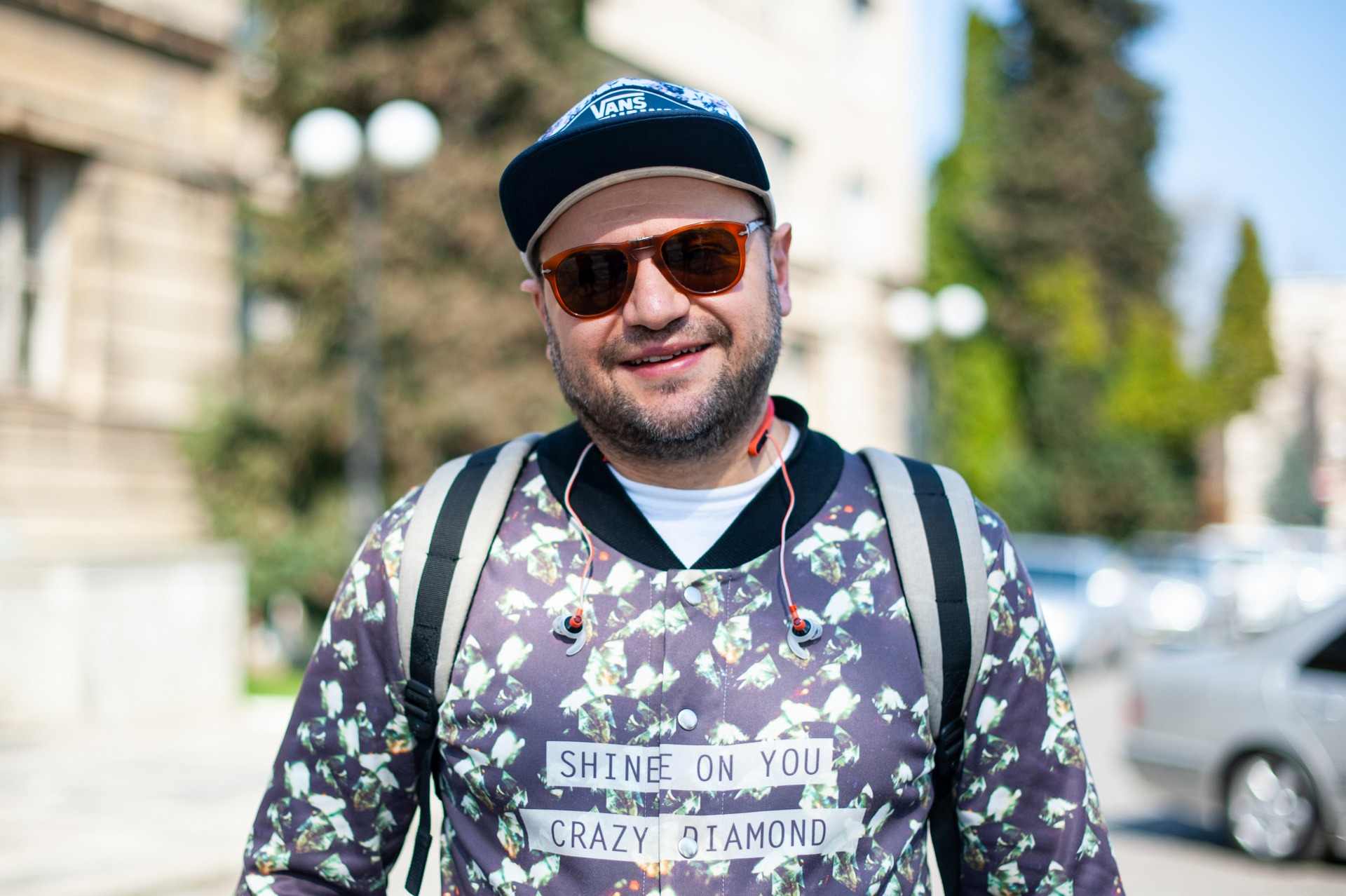
Tudor Kilaru
a showman
It’s hard for me to give a definite answer to the question “Who am I by the nationality?”, and – is it really necessary to have such identification? I was born in Far East of Russia, my parents were from Moldova. I was not yet a 1-year old when we moved to Uzhhorod. But I took my studies in the USA and worked in Turkey as well.
As I was a pupil of the primary school, I was ashamed of my name and origin. So I used to introduce myself to other kids as Fedir and felt uneasy supposing they would start mocking at my Moldavian origin. Even as I was registering for a volleyball club in Uzhhorod, I can clearly remember myself putting my mother’s surname, Koretskiy and not Kilaru. However, thanks to the Resident Registration Office, each of my family has a different surname in their documents. I guess, public employees are not accustomed to hear such strange combinations of letters!
In my senior school I began to identify myself as a Romanian, for it was Romanians and not Moldavians that our family presented themselves among the national minorities of the region. However, we have very little in common with the Romanians of Transcarpathia.
Since I was born in the USSR, the language of communication in our family, apart from the native Romanian language, was Russian. I learnt Ukrainian later on, in my senior classes and as a freshman in the institute. I must recollect here that my grandpa by my mother’s line was a Polander.
Of course, the blood in my veins makes an impact on me. As I hear the national music – real and live, with no remakes – I can feel some of my heartstrings ringing. It also shows in my temper, gastronomical tastes. But that’s all, I guess. I never studied Romanian poets or writers so I cannot be proud of them, respectively. I studied in a Ukrainian school with Russian being the language of study. So all of the heroes from my childhood are just the same as with a common Ukrainian boy, once living in Uzhhorod.
And, when I am in Romania, I don’t feel a Romanian either. There I am either Ukrainian or a Moldavian, at best. In Moldova they see me as a Ukrainian, and in Ukraine I am a Romanian. That is to say, in each of my motherlands I am “at home among strangers”, a foreign native. Always so.
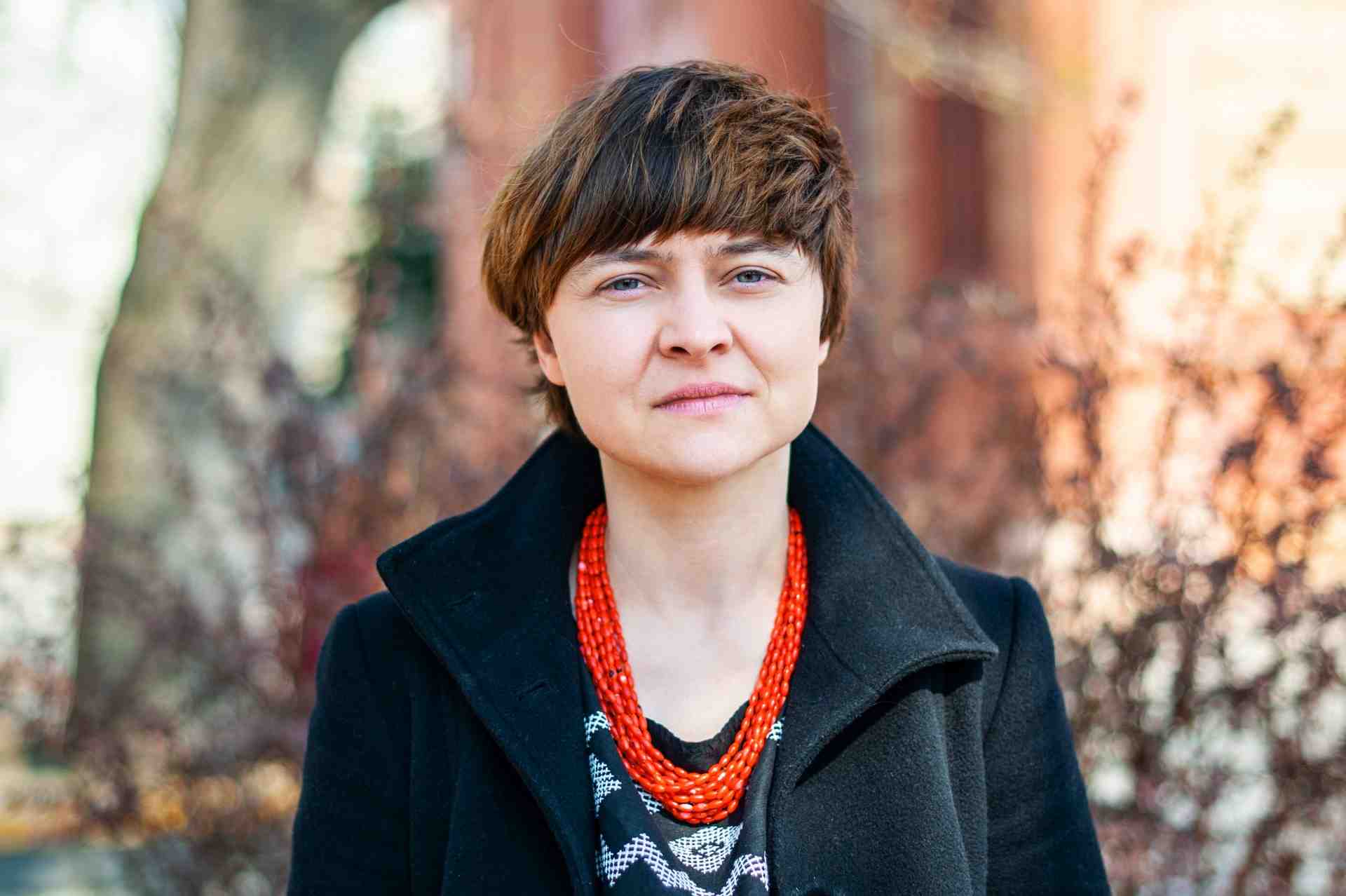
Tetiana Smriga
a manager in cultural projects
I’ve always had difficulties with my national identification. I know y family’s history down to the third generation but this is enough to find as any as seven nationalities: Hungarians, Slovaks, Rusyns, Romanians, Greeks, Germans, Russians.
I feel myself a globally minded person. Well, to put it more carefully, a European. I perceive this culture and I feel it in myself, carry it with me, by my own self.
I remember as I was quite a baby, my grandpa used to tell me: “Remember, over there (pointing to a settlement abroad) you have a brother, Zsolti, and a sister, Zsuzsa, they’re Hungarians. And over there (pointing in another direction) you got a sister, Michaela, she’s a Slovak”. Honestly, I didn’t remember the names then, so I’m just making them out of my head now. I don’t think I will ever meet these people. But it has always puzzled me: why is everybody in my family of a different nation? And what is a nationality in general? Why one of my grandpas thought himself a Slovak although his mom was a Greek and the father was a Hungarian German? And his own sisters thought they were Hungarians for all of their lives and spoke only Hungarian.
Just like all Transcarpathian, I feel that I rather belong to this land. To Transcarpathia, the Carpathian Mountains, Uzhhorod. I remember as once in y school the teacher of history asked the whole class of 43 pupils: “Raise your hand you, whose both mom and dad are ethnical Ukrainians”. And then nobody did, everybody was just embarrassed and surprised and looked at the others. That does not mean, of course, that I don’t feel respect for Ukraine, don’t feel myself a part of the Ukrainian people and the Ukrainian state. I just know that there is more than that in us.
There is one funny thing: in the old Birth Certificates there is no such entry as “nationality”, only the entry “confession”. The notion of nationality appeared not so long ago, the more so with the region of Transcarpathia. When the Soviet authorities came to power everybody identified themselves as they wished, and that’s how different names and surnames appeared in the passports and even different patronymic names for blood brothers and sisters. Well, I suspect everybody filled in the nationality entry as their intuition for political forecasting told them.
For me nationality is a like an important fact of history, that of the world and my personal one. I want to know it and use it as a means of broadening. To broaden my world, my world view and my abilities.
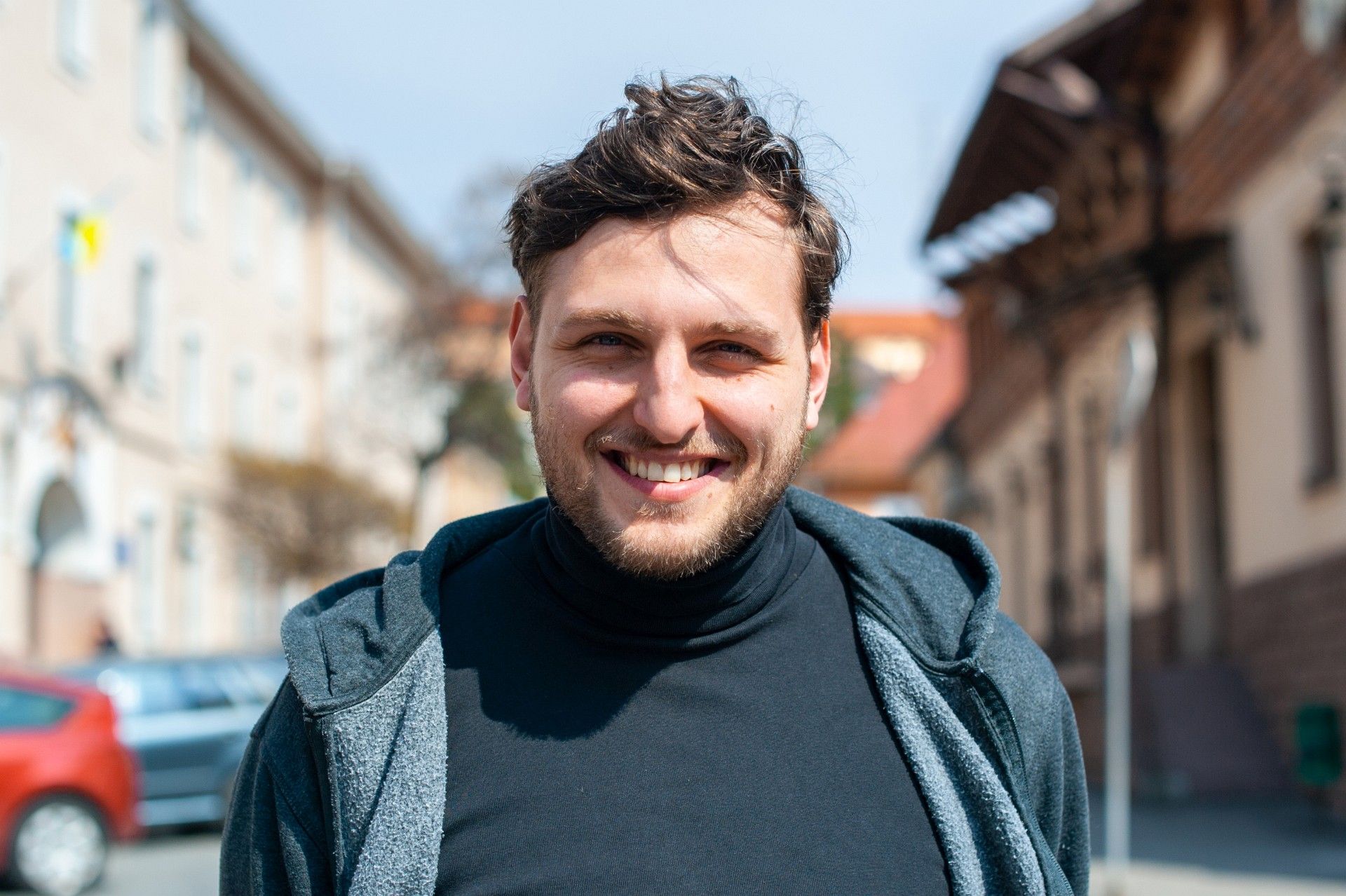
Ammar Sapozhnikov
Project owner in “Yizh Dvizh” (Eat and Act)
I am a Ukrainian of Arabic origin. Born in the very downtown of Odessa, brought up in a typical smoky communal apartment with Jewish people next door. I danced the Ukrainian Hopak as a child and finished it with three words – Sapozhnikov Ammar Khuseynovich.
Each people is interesting for me in its own way – both Ukrainians and Syrians. Each has something individual and sacred that built up its history and distinctiveness. As for the mentality, that’s already a result, an impact of a given people onto a new generation. On the one hand, I feel close myself the mentality of Odessa. This means, first of all, some openness, a sense of humor, a creative approach to the matter and working for yourself. On the other hand, it has its own disadvantages. When the peak season comes in Odessa, it’s hard to keep the pace. You get a wish to relax and be idle while you have to be the other way round.
Uzhhorod reminds me Odessa in a way, the difference is that there’s the sea over there and here you have mountains. People, architecture, culture, multinationality. Everything is much alike. If not for the whole of it, I’m not sure if I could live here. I would have taken my wife to Odessa, teaching her to go fishing and then it would depend on the luck of the draw.
One of the most interesting stories related to mu nationality happened when I was a child and used to go to my relatives in Russia. My grandma and I used to go to the vicinities of Moscow. Up until I was ten, I had my father’s patronymic name – Barakat. When it was our turn to show the documents, the border officers were stunned and then started checking us like nobody else. Well, I could as well imagine that – some Mrs. Sapozhnikova Lilia Andriivna escorts an under-age child, Barakat Ammar Khuseinovych by name. One could imagine all kinds of stuff, depending on one’s imagination.
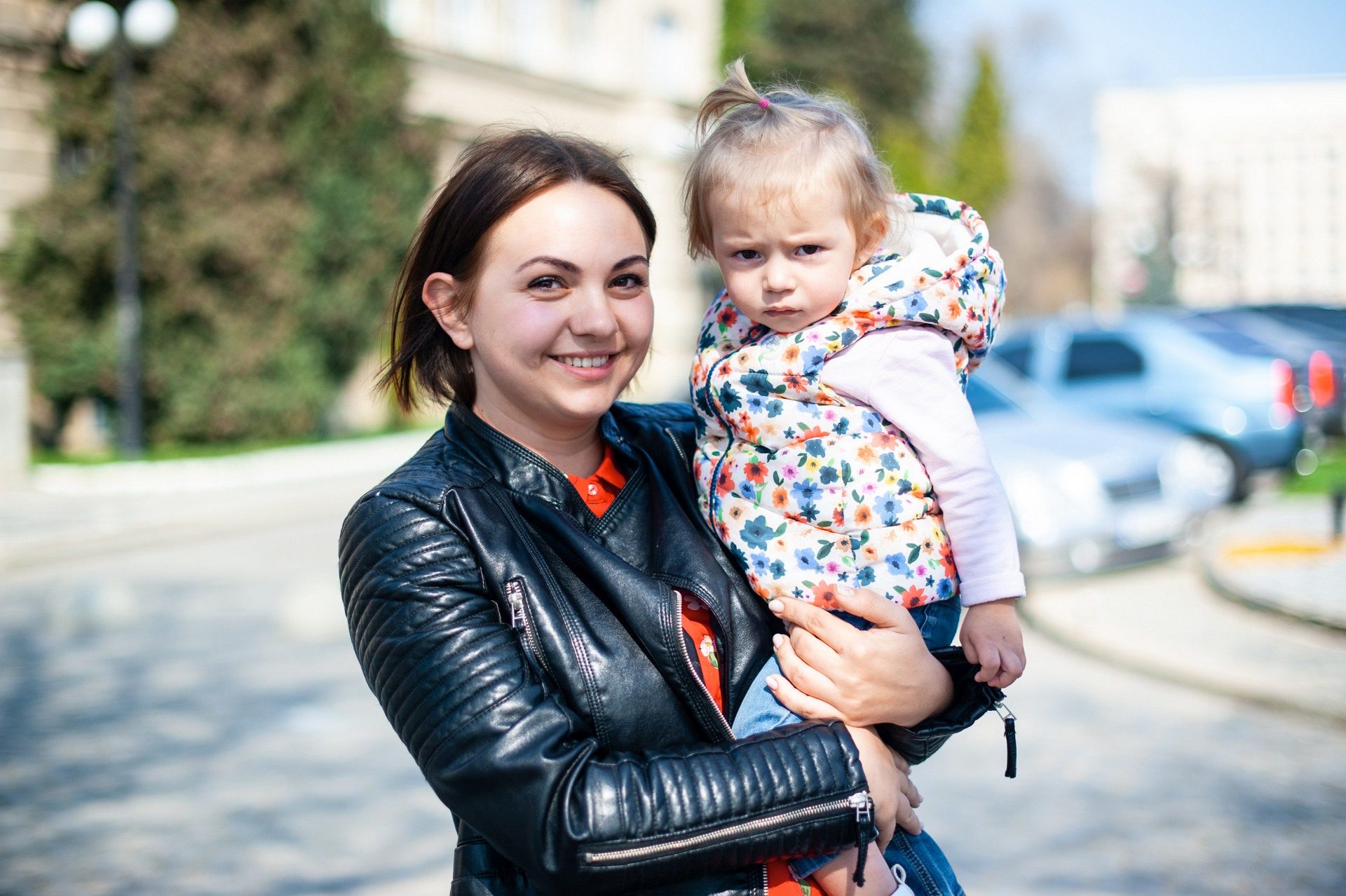
Yulia Antonova
a mother of three girls
I got Russian and Turkish blood from my father and Ukrainian and Polish – from my mother. My grandma, Ivanna, was from the West of Ukraine by her mother’s line, from the region of Ternopillia. Grandpa came from Tambov, Russia. As he was a military man, he was allocated to Transcarpathia. First he lived in Germany and then moved to Mukachevo, because there used to be a great military subunit here.
My father’s family are Russians from Byelgorod, and the Turks in the family are out of nowhere. The surname of Turynin makes me think so. There is no such family name in Transcarpathia. And even in Ukraine we are alone. At least, so it was when Father did a research on the issue. Once we found a very distant relative from Syberia with the same surname. He was also interested in his family tree and, as a result of a multiyear research, he had traced this relation to Turkey. That’s how come that we have blood of Turkish janissary in our veins.
I am a Ukrainian and have always identified myself this way. And for the last few years this feeling has grown especially strong. Lots of our relatives live in Russia and it’s hard to defend one’s position communicating with them. Sometimes the price is the relationships with relatives. And I got a feeling that our uncle cannot hear what we say. While my father, with not a single drop of Ukrainian blood, behaves like a real Ukrainian.
I remember, still in my childhood, when they told me that I was a Russian, I used to response that I was a Ukrainian from the district of Tiachiv town. That’s where I was born. In the village of Dubove (situate in Tiachiv Disrtict – by Editor) there was a great workshop where they produced engines for helicopters. Das used to work there as an engineer, actually they had been assigned to Transcarpathia as he graduated from the Kharkiv Aviation Institute. There, as a student, he had a mate with my mom’s brother and the latter took him to a party at his grandma’s at home. That’s how they made friends with my mom and Dad moved to Mukachevo.
So my brother and I were the first from the family to be born in Transcarpathia. Although we are from a Russian-speaking family, we have never identified ourselves as Russians and have always felt Ukrainians.
It seems to me that I feel Ukrainian blood most of all in veins. Though the branch of the Turynins family is a purely Turkish one. We are all emotional and hotheadies, only a second will be enough to have an explosion. I’m afraid it’s impossible to get rid of such traits.
Definitely, I would like to have something important from each blood, each nation. As for the Turks, I would borrow the loyalty to the family. It has always been in the first place to me. As for Ukrainians, I would take their kindness. And probably, the ability to adopt is what I would have from the Russians. No other nation can accept things as they are.
Regardless from the blood in our veins, my husband and I try to pass to our three daughters our main value: family is the most important thing.
We are also suggesting you should watch our reel. We made it as a part of our special project “The Roots”.
Text and idea: Rosana Tuzhanska
Photo and video: Anton Ryzhykh
Disclaimer: the present material is presented by the civic community of “Institute of Central European Strategy” with the support by US Agency for International Development (USAID). Creating the material became possible with sincere support from the American people as provided via US Agency for International Development (USAID). The contents or the material is a sole responsibility of the civic community of “Institute of Central European Strategy” and down not necessarily reflect opinion of USAID or USA government. Reproduction and use of any part of this material in any format, including graphical, electronic, copying or using in any other way whatsoever is prohibited without a link to the original source.
